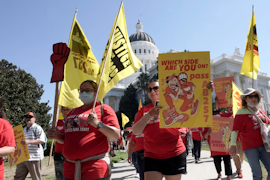|
"Fight for $15" & The Union Efforts Get a Big Push in Calif's Fast Food Bill
"One of the most significant pieces of employment legislation passed in a
generation"
California Approves Nation-Leading 'Fast Recovery Act' - Groundbreaking
Legislation Giving Half-Million Fast Food Workers Increased Power & Protections
AB Bill 257:
The Fast Food Accountability and Standards Recovery Act or FAST Recovery
Covering fast food restaurants with at least 100 establishments nationally.
 The
bill will
create a new 10-member Fast Food Council
with equal numbers of workers’ delegates and employers’ representatives, along
with two state officials,
empowered to set minimum
standards for wages, hours and working conditions
related to the health, safety, and welfare of,
and supplying the necessary
cost of proper living to fast food restaurant workers. The
bill will
create a new 10-member Fast Food Council
with equal numbers of workers’ delegates and employers’ representatives, along
with two state officials,
empowered to set minimum
standards for wages, hours and working conditions
related to the health, safety, and welfare of,
and supplying the necessary
cost of proper living to fast food restaurant workers.
The
bill would also
authorize a county, or a city with a population
greater than 200,000, to establish a Local Fast Food
Council, and
would prescribe its powers and requirements for its composition. The bill would
authorize a Local Fast
Food Council to provide
recommendations to
the council.
This bill would require
standards for minimum wages,
maximum hours of work, and other working conditions
fixed by the council to be the minimum standards for fast food restaurant
employees, absent a valid collective bargaining
agreement, as specified, and would require that they be enforced by
the commissioner, as specified, and the
Division of Labor Standards Enforcement.
By expanding the
application of crimes associated with those enforcement procedures, this bill
would impose a state-mandated local program.
The bill would require the Labor Commissioner and the commissioner’s deputies to
take assignments of violations of standards issued by the council upon the
filing of a claim in writing by an employee or an employee’s authorized
representative.
&uuid=(email))
A late amendment would
cap any minimum wage increase for fast food workers
at chains with more than 100 restaurants
at $22 an hour next year,
compared to the
statewide minimum of $15.50 an hour,
with cost of living increases thereafter.
This bill would
prohibit a fast food
restaurant operator from discharging
or in any manner discriminating or retaliating against any
fast food restaurant employee
for specified reasons
and would create a cause of action and right to reinstatement for employees in
this connection, as well as a presumption of unlawful discrimination and
retaliation in certain circumstances.
What they're saying:
Union organizers and other advocates say
wage theft and other
exploitations are common in the fast food industry.
The debate has drawn attention nationwide, including on Capitol Hill where
Democratic U.S. Rep. Ro Khanna
has expressed hope it will trigger similar efforts elsewhere.
It's “one
of the most significant pieces of employment legislation passed in a generation,"
said Columbia Law School labor law expert Kate Andrias. She called it “a huge
step forward for some of the most vulnerable workers in the country, giving them
a collective voice in their working conditions.”
The bill grew out of a union movement to boost the minimum wage and Andrias said
it would “work in conjunction with traditional union organizing to give more
workers a voice in their working conditions.”
“We made history today,”
said Service Employees International Union President Mary Kay Henry,
calling it “a
watershed moment.”
“If we are successful here,
workers in Florida, Texas, New
York, even Idaho will be heartened and they can replicate our successes,”
Democratic Assemblyman Alex Lee said at the workers’ rally.
It grew out of the decade-long
Fight for $15 and a Union
minimum wage movement and efforts by labor unions to organize fast food workers
in California
and nationwide.
Editor's Note:
If Gov. Newsom signs it, it
could open the flood gates for
unionizing the entire fast food industry nationwide
over the next few years as well as the immediate ripple effect on Starbucks,
Apple stores, and Amazon. Depending how Gen Z and social media responds this
could become a movement.
But to establish Local Fast Food Council's with the power to drive wage
recommendations, report on working conditions, inspect stores, and issue
citations like OSHA, this is a first and depending on how it works out, at the
end of the day this will change the industry.
And will also have an impact
on Loss Prevention practices and potentially LP technology within the specific
group of stores.
apnews.com
ca.gov
|